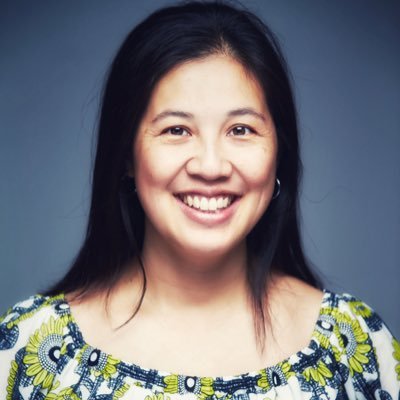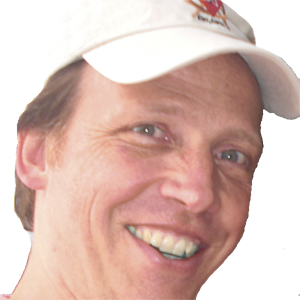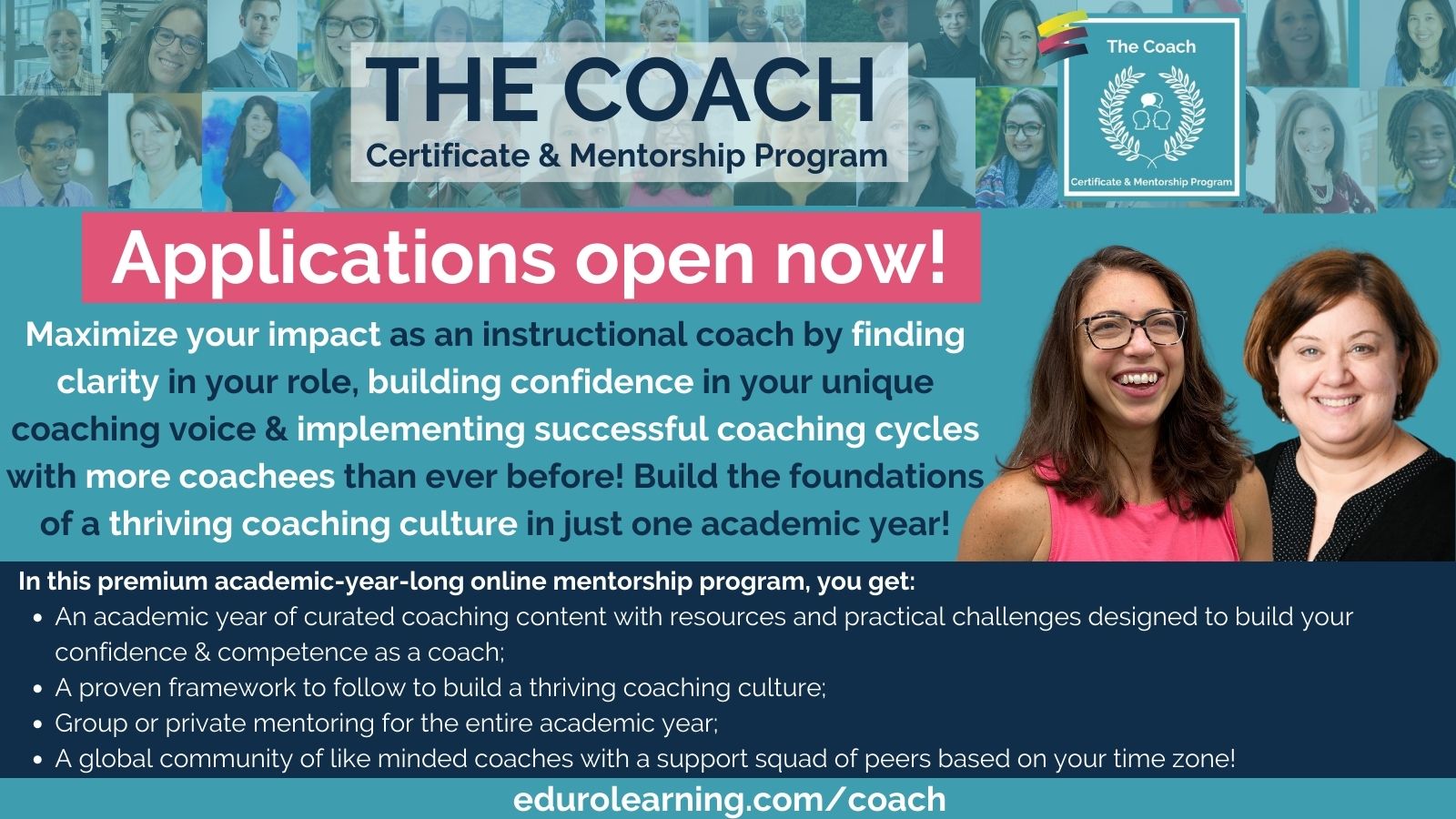In this #coachbetter episode, Kim takes a deep dive into the experience of the Innovation Team at Keystone Academy in Beijing right after they finished their custom cohort with Eduro Learning’s The Coach Certificate and Mentorship Program. You’ll hear how the school began developing the coaching program, the impact of having a cohort of coaches participate in The Coach, and the next steps for each individual team member and the school as a whole. Designing a coaching program is no easy task, but you don’t have to go it alone! You can get the support you need inside The Coach, or have us create a custom cohort just for your school! You’ll hear a lot about the learning that happens within The Coach Certificate and Mentorship Program. Wherever you are in building a coaching culture in your school, The Coach will give you the strategies, skills, and tools you need to make coaching a success.
Subscribe to #coachbetter via your favorite Podcast Player!
Featured Guests




Bonus! Watch the Spotlight Version on YouTube!
SHOW NOTES
Tell us about your school & your team. When we began our work together, what was your team & your school’s understanding of coaching? How would you describe the “state of coaching” at Keystone a year ago?
Sandra: Bilingual K12, private non-profit, in Beijing. International style, but most students are from China. Team started 3 years ago, 4 people with ICT teachers and ICT program. Became clear that we were an older model of how tech should work, tech was a class / content area. Moved to a coaching model for the whole school at the beginning of this year. Team expanded, so there was a lot of work to help us understand our roles. Some of us had some experience, but the word coaching is so broad, we all had different understandings. Figuring out how to have a common definition of coaching.
Eric: One dept has teachers from 8 different countries. Adds a whole element of subtlety to coaching. School is new, had a clear vision of focusing on change, very well-resourced, and cutting edge. Defining coaching was a big piece of enlightenment for all of us.
Tina: So privileged that Sandra brought us together. When I was first starting, my perception of coaching was consulting (I was the expert), found that to be kind of overwhelming. When I did this course, I realized there were other coaching stances I can use like collaborating & coaching. I didn’t know that I could be someone that would learn from all of these people. There’s so much that I learned with other experts and their leadership. I still have so much to learn, and I’m so grateful that I was given this opportunity.
Penny: My initial position was tech integrator (after classroom teacher). My job was innovation coach and I felt like it was a big leap. I took a bigger leap that I expected, I had a big learning curve. I saw coaching as mentoring at the beginning, but in reality things didn’t happen quite the way I expected. I had a lot of teachingable moments for myself. We all read the same material, but all digest it differently, it was so helpful to learn through everyone’s perspective. It offers me more empathy to see others and teacher’s mindset. This program helped me rethink my whole career, when I became a coach it helped me see teaching from a bigger picture. Being a coach helps me connect the dots and see bigger vision.
What were the big impacts / learning within your custom cohort? For other schools (or coaches) that are currently where you were a year ago, what recommendations do you have for them in terms of focusing their learning and efforts?
Sandra: Have a plan in mind so you can pitch to your leadership team. Helped me wrap my mind around our bigger goals for the team. Made the mentoring sessions more valuable. Have a direction of where you want to go, then add in flexibility. We had some ideas, but we had to adjust because things change. Have some flexibility about where you want to go, but you also have directions on where you want to go. It’s ok to change and be flexible. We did a lot of work more individually in this program, would have been more powerful if we worked in teams. It’s nice to have an external party to bounce ideas off, working in teams. If I lead it or they are left to lead it themselves, you get sidetracked into the minutia of the school day.
Eric: It’s easy to get caught up in the details, and much more important to think bigger picture, someone that’s outside so it doesn’t feel like it’s evaluation.
What’s YOUR level of coaching mastery?
All coaches go through various stages of coaching mastery. Once you identify where you’re at, you can begin to build the skills needed to move to the next stage.
This quiz is based on real-life case studies compiled from years of working with coaches inside The Coach Certificate & Mentorship Program!
When you receive your results, you’ll also get your matching case study from the STRIVE Case Studies to see where you fit in the stages of coaching mastery.
Ready to tackle your challenges and move on to the next level in YOUR coaching practice?

The STRIVE Model of Coaching Mastery quiz will help you identify your level of coaching mastery by matching you with case studies compiled from years of working with coaches inside The Coach Certificate & Mentorship Program so you can easily see where you fit!
When you complete the quiz, you’ll get:
- Your matching case study,
- Specific strengths & challenges aligned to your result;
- Suggested next steps for each stage;
Plus the Case Study Document includes:
- Case studies leveled by coaching mastery;
- A framework to identify essential stages of professional growth & key areas to focus on in your professional learning;
- Alignment with the THRIVE Model for a Successful Coaching Culture;
- Space for you to reflect & prioritize so you can take action immediately!
You’ll go straight to the Quiz, and get the Case Study Document via email.
Show Notes continued…
How were you able to apply your learning during the cohort? What did being part of this program look like for you “in action”? How could an experience like this help other schools build their coaching program?
Tina: Being able to focus on what’s in my control. I want to work with so many different people, which means I miss out on people who are keen to work with me. My mind is so focused on things that are bigger & beyond my control. I need to focus on the things that matter, that are in my control, and what people need, rather than my personal agenda. Having a pre-meeting conversation with questions planned ahead of time, instead of an ambush interview. Focus on what’s within my control and think of the other person, rather than just my agenda. Really be able to listen to others.
Penny: I can recognize better when and where to share resources for teachers when they’re needed. More accurate planning with my coachee is helpful. I learned a lot from listening skills. Normally I jump in too soon. I learned to be patient. I learned to listen first. My coachee made the realizations that I wanted her to see, but she realized it on her own, rather than me telling her. It really pays off when my coachee has the reflection, rather than me saying it. Deep listening skills really helped me, as a mindset.
Eric: Learned ways that I can be more subtle without stepping in. Time to follow up for reflection is key.
Sandra: Final project was a really good exercise of reflection, to be able to reflect back from the beginning. Now i feel comfortable with our next year’s direction, where we’re heading. It was affirming to interview the coaches & coachees and leaders to get their insight.
What’s next, for you as an individual? For you, as a school? For other schools that are in the same place, how do you recommend they get started?
Sandra: building a school wide understanding of what coaching is, working with more teachers to get more practice coaching. Defining our curriculum & teaching and learning goals, and how we as a team can be more cohesive in our coaching strategy. This year we were more hodgepodge, if we can be more strategic, we can be a lot more effective, and be more aligned with the rest of the school and the leaders and their goals. If we can align more with teaching and learning goals, it pulls us a little bit more away from “IT Support” our role is on teaching & learning and student learning. We still want to continue to develop our coaching skills and helping each coach identify the areas they want to develop their coaching skills. For me, more coaching dialogue, questions, prompts, in coaching conversations; being able to say “tell me more”
Tina: I’m moving to a new school, and my worry about moving was that “where do I start”, but now I feel like I have structures and directions and a map to start with. I have so much to learn, but I have a solid foundation. I know how to start, I know I have a backpack with me that I can carry as I move on to the new school. The modules were so powerful that there are so many things I can apply and actionable points that I can use to support all stakeholders. They are exactly what I need as I move on. Wherever I go, there are things I can use and are already in place.
Penny: Privileged to work with a group of people who share the same vision and mission. We can continue to build our skills. Will promote the idea that I’m an instructional coach, not IT support. Would like to bring in some instructional design. Want to see more teachers implement their learning with their students.
Eric: Looking ahead to the fall, laying a foundation for how teachers can work with us. The way in which that conversation is started has a huge impact on how clear you are about setting goals and the working relationship. Applying a survey to get feedback on how coaching is working. Continuing to refine those kinds of tools so that we can continue to adapt and refine & improve.
Level Up Your Coaching with The Coach!
If you are ready to develop your coaching practice over the next academic year, and explore topics like transitioning your work from individuals to teams, please join us for our next cohort of The Coach!
Wherever you are in building a coaching culture in your school, The Coach will give you the strategies, skills and tools you need to make coaching a success and will empower you to confidently apply instructional coaching strategies in any situation – from building a coaching program, to having coaching conversations, to being a leader in your school community. We facilitate only one cohort each academic year so we can offer individualized support for each participant.
Registration for our next global cohort opens once a year – check the website for details!

Find out more at: https://edurolearning.com/coach/





Recent Comments